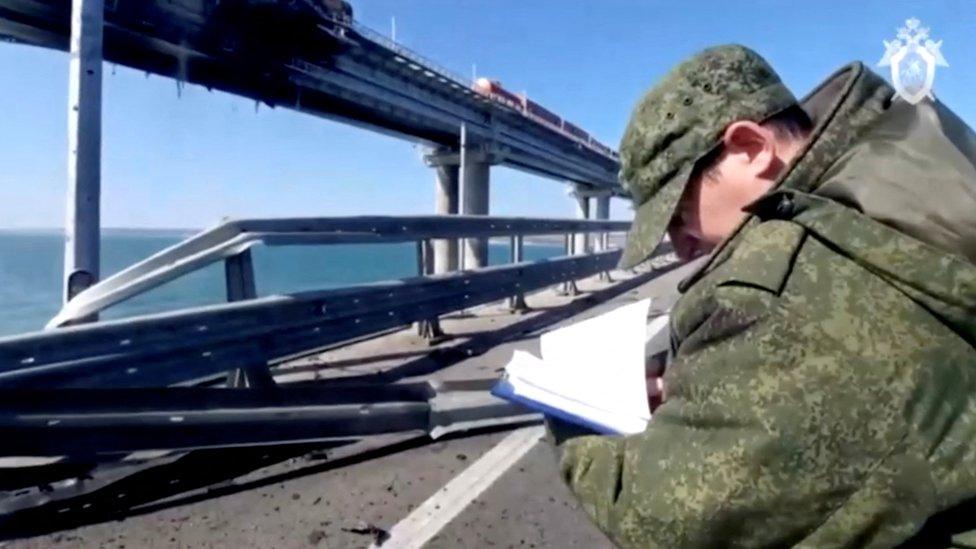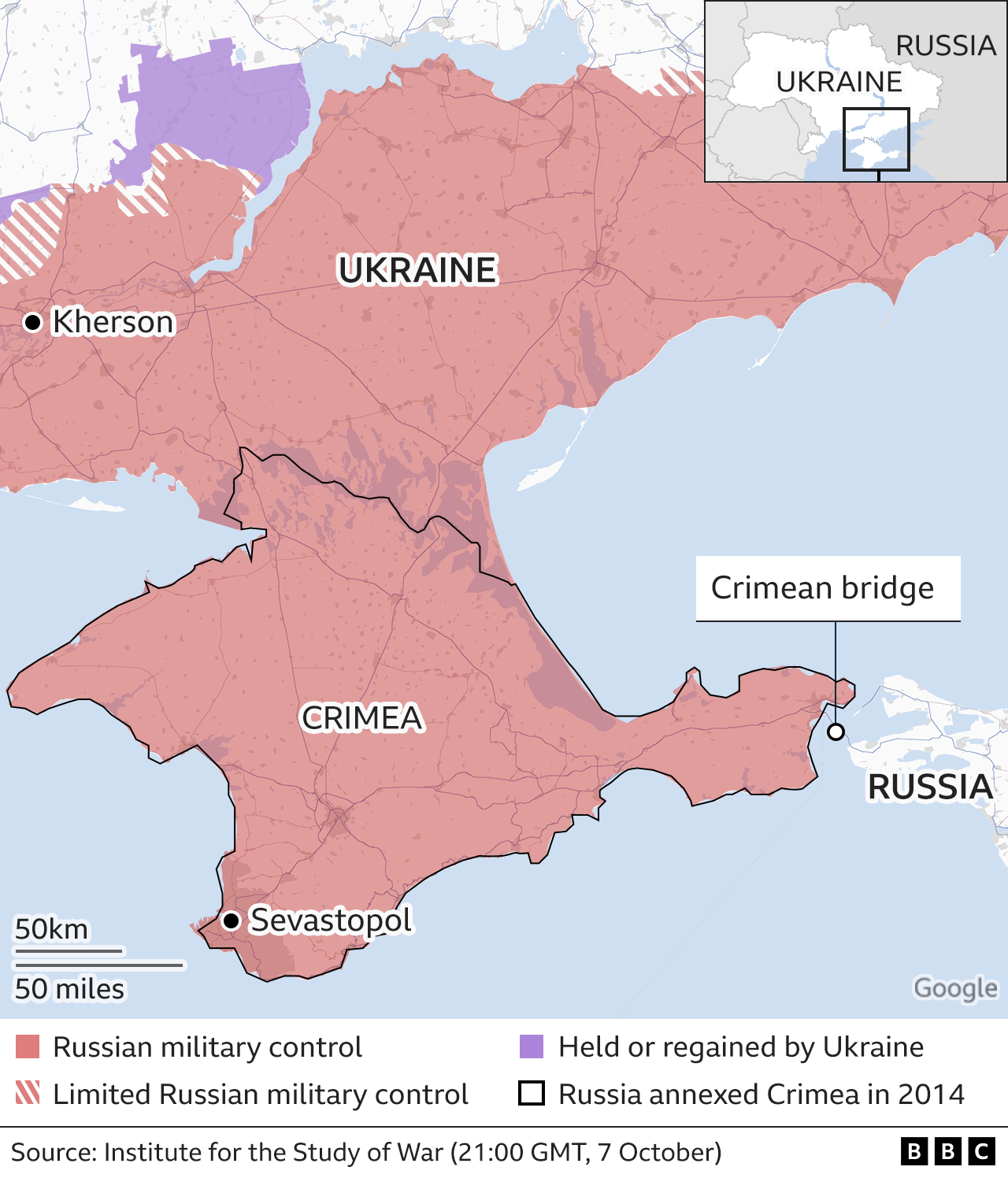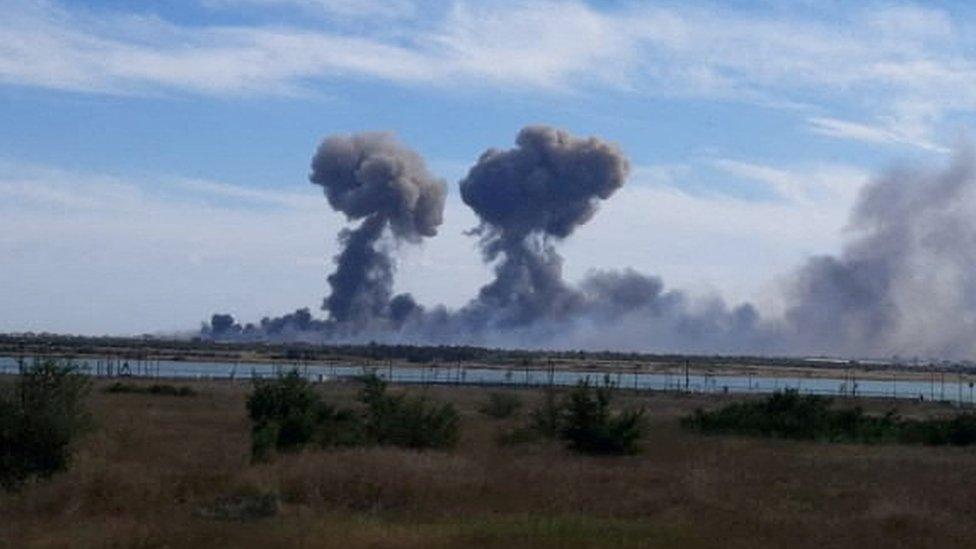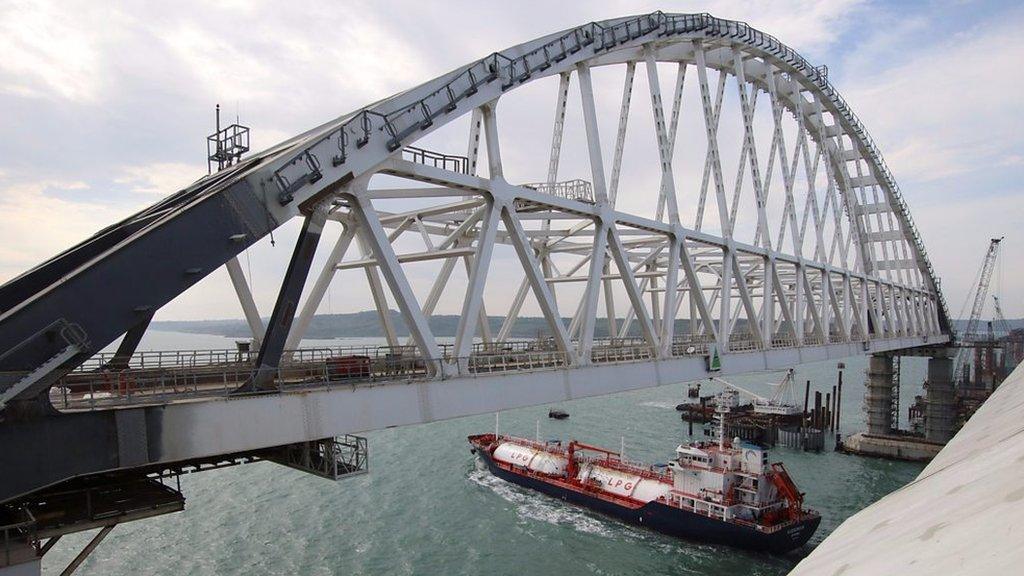Crimea bridge partly reopens after huge explosion - Russia
- Published
Watch: Fire and smoke seen on Crimean bridge after explosion reported
Light traffic has resumed on Russia's only bridge to Crimea, hours after a huge blast brought down sections of the roadway.
The blast on Europe's longest bridge - a symbol of Russia's annexation of the peninsula from Ukraine in 2014 - killed three people, investigators say.
The victims were in a nearby car when a lorry blew up, Russian officials claim.
The railway part of the bridge - where oil tankers caught fire - has also apparently reopened.
On Saturday evening, Russia's foreign ministry published a video, seemingly showing cars using the bridge.
Allow X content?
This article contains content provided by X. We ask for your permission before anything is loaded, as they may be using cookies and other technologies. You may want to read X’s cookie policy, external and privacy policy, external before accepting. To view this content choose ‘accept and continue’.
The rail and road crossing was opened in 2018 and is a key supply route for Russia's invasion of Ukraine.
An adviser to Ukraine's President Volodymyr Zelensky, Mykhailo Podolyak, did not directly claim Ukrainian responsibility but wrote: "Crimea, the bridge, the beginning.
"Everything illegal must be destroyed, everything stolen must be returned to Ukraine, everything occupied by Russia must be expelled."
Ukraine's defence ministry compared the bridge explosion to the sinking of Russia's Moskva missile cruiser in April.
"Two notorious symbols of Russian power in Ukrainian Crimea have gone down," it tweeted. "What's next in line?"
The Ukrainian government itself simply tweeted: "Sick burn."

Russia's foreign ministry said: "The Kiev [Kyiv] regime's reaction towards destruction of civilian infrastructure is a testament to its terrorist nature."
In other developments:
Ukraine's giant Zaporizhzhia nuclear plant, which is held by Russian forces, has lost all external power and is relying on emergency diesel generators for the electricity it needs for reactor cooling, according to the director general of the UN nuclear watchdog
Russia has appointed Air Force General Sergey Surovikin as the new commander to lead its forces in Ukraine
Russian media accused Ukrainian forces of shelling a printing house in the separatist-held city of Donetsk.
It is hard to exaggerate the significance, and symbolism, of seeing the bridge - which was opened by President Putin - on fire.
Russia has used the bridge to move military equipment, ammunition, and personnel from Russia to battlefields in southern Ukraine.
As such, Ukrainian authorities said it was a legitimate target, as they vow to retake the peninsula.
Any attack on Crimea, where the Russian army has a massive presence, will be seen as another massive humiliation for the Kremlin.
The bridge is particularly hated by Ukrainians. Social media in Ukraine erupted in celebration on seeing the fire - one day after Russian President Vladimir Putin turned 70.
Local authorities in Crimea organised a ferry service between the Russian mainland and the peninsula, for heavier vehicles that can't use the partially reopened bridge.

Scorch marks could be seen on the railway bridge on Saturday
Russia's National Anti-Terrorism Committee said: "At 06:07 Moscow time today [03:07 GMT], an explosion was set off at a cargo vehicle on the motorway part of the Crimean bridge on the side of the Taman peninsula, which set fire to seven fuel tanks of a train that was en route to the Crimean peninsula.
"Two motorway sections of the bridge partially collapsed."
Crimean parliamentary speaker Vladimir Konstantinov blamed the explosion on "Ukrainian vandals, who have finally managed to reach their bloody hands to the Crimean bridge".
Russian President Vladimir Putin was briefed about the "emergency" on the bridge and ordered a government inquiry, Kremlin spokesman Dmitry Peskov said. A criminal investigation is also under way.
The 19km (12-mile) bridge across the Kerch Strait, which cost £2.7bn to build, was opened four years after Moscow illegally annexed Crimea.
It was hailed by Russian media as "the construction of the century". Russian officials previously claimed it was well protected from threats from air, land or water.

The crossing is more than 100 miles from Ukrainian-held territory. One explosives expert told the BBC the fire was probably not caused by a missile.
"The lack of obvious blast / fragmentation damage on the road surface suggests that an air-delivered weapon was not used," he said.
He said it was possible that "a well-planned attack from below may have been the cause".
"I suspect explosives on the road bridge and train deck were initiated near simultaneously using coded radio command," he added.
Kyiv has the momentum in this conflict. The army has reclaimed large swathes of territory, forcing Russian troops to abandon long-held positions.
Amid the losses, Moscow has begun a chaotic military mobilisation - which led to rare anti-war protests in Russia, and a huge exodus of military-age men.
On Russian TV talk shows, presenters and studio guests have been expressing increasing doom and gloom about the situation.
If the attack were carried out by Ukraine, it would not be the first time it has targeted Crimea.
Last month, Ukraine claimed responsibility for a series of air strikes on Crimea - including an attack on Russia's Saky military base.
The $3.7bn (£2.7bn) bridge links southern Russia with the territory it annexed in 2014 (2018 report)
Additional reporting by Fiona Nimoni and Alexandra Fouché, BBC News, London
Related topics
- Published7 September 2022

- Published15 May 2018
